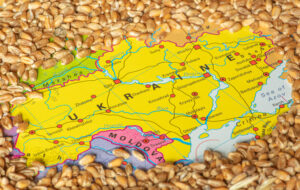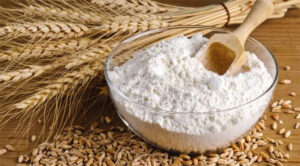
The United States will support Ukraine’s grain exports to markets that desperately need them, White House press secretary Karine Jean-Pierre said during a briefing.
“We are going to continue to support Ukraine’s efforts to get Ukrainian grain to markets that desperately need it,” she said.
The spokeswoman also noted the provision of U.S. financial support and supplies for Ukrainian farmers, such as seeds and fertilizer, as well as assistance with crop storage and processing.
In addition, Jean-Pierre recalled that the U.S. government is providing Ukraine with $250 million in financial assistance to support the agricultural sector.
“The United States will allocate another $250 million to the AGRI Ukraine initiative to help Ukrainian farmers produce, store and export agricultural products and grain to global markets,” she emphasized.

Exports of grain crops through the four main Polish seaports in MY 2022-2023 (July 2022-June 2023) exceeded 6.6 million tons, 70% more than in the previous MY, when almost 3.9 million tons were exported, said Marcin Wroński, deputy head of Poland’s National Center for Support of Agriculture (KOWR).
“The very large increase in grain exports by sea – by 70% – in the 2022/2023 season was made possible by the fact that in order to solve the problem of grain surplus on the domestic market, the Polish government took measures aimed at improving logistics and transportation capacities,” Marcin Wroński was quoted as saying by Polish publication farmer.pl.
Financial incentives for farmers in the form of grain subsidies also played a major role, which had an impact on export volumes through the Baltic Sea berths, which have been growing month by month, explained the deputy head of KOWR.
According to him, in the 2022/2023 season, wheat was mainly exported through the national seaports – more than 4.4 million tons compared to almost 2.1 million tons a year earlier, as well as corn – more than 2 million tons compared to about 1.3 million tons in the previous season. 74,000 tons of triticale, 68,000 tons of rye, 64,000 tons of barley and 16,000 tons of oats were also shipped through Baltic ports.
Wroński noted that grain was exported mainly through the seaport in Gdynia – 52%, or 3.5 million tons. Another 31% of the volume, or 2 million tons was shipped through the port of Gdansk. Exports through the seaport of Szczecin-Swinoujście amounted to 17% – about 1.1 million tons of grain.
“May and June (2023 – IF-U) were record months for grain exports by sea: in May we exported 882 thousand tons of grain through ports in Gdynia, Gdansk, Swinoujście and Szczecin, and in June this figure reached 937 thousand tons. We have never had such a result as in June,” emphasized the deputy head of KOWR.
He added that grain exports were also carried out through smaller ports, such as Kolobrzeg, so the total grain exports through the ports in June approached 1 million tons.
According to KOWR’s calculations, in the 2022/2023 season grain exports through sea, road and rail channels totaled more than 11 million tons, which was a record result in the history of Polish grain trade.

Enterprises for operations with ferrous scrap in January-June of this year reduced scrap metal procurement by 25.2% compared to the same period last year – up to 531 thousand tons.
As reported in the operational information of the Ukrainian Association of Secondary Metals (“UAVtormet”) on Wednesday, the export of scrap metal for the period amounted to 92 thousand tons compared to 28.7 thousand tons in January-June-2022 (growth in 3.2 times). At the same time, import of scrap amounted to 0.5 thousand tons, while in the first six months of last year it amounted to 1.6 thousand tons.
Scrap deliveries to the country’s steel enterprises in January-June 2023 decreased by 37.2% compared to January-June 2022 – to 413.8 thousand tons from 659.4 thousand tons.
As of July 1, 2023, the level of scrap metal stocks at Ukrainian metal enterprises was estimated at 15-20 thousand tons.
As reported, Ukraine in 2022 reduced scrap procurement by 75.9% compared to 2021 – to 996.7 thousand tons from 4.136 million tons. Scrap metal exports last year amounted to 53.6 thousand tons, which is 11.5 times less compared to the previous year (615.7 thousand tons). At the same time, scrap imports amounted to 1.8 thousand tons (23 thousand tons in 2021).
Scrap deliveries to the country’s metal enterprises in 2022 decreased by 73% compared to 2021 – to 895.7 thousand tons from 3 million 323.4 thousand tons.
“UAVtormet” forecasts in 2023 the procurement of ferrous scrap in the amount of 1.2-1.25 million tons. In addition, scrap deliveries to the country’s metal enterprises are forecast to amount to 950-1000 thousand tons. Export of scrap metal is expected to amount to 180-200 thousand tons, import – 0.2-0.5 thousand tons. Steel output is expected to be 4.8-5.2 million tons.

Ukraine in January-June this year increased exports of pig iron in physical terms by 26.1% compared to the same period last year – up to 799.692 thousand tons. According to statistics released by the State Customs Service (SCS) on Monday, during the period, pig iron exports in monetary terms amounted to $309.146 million (down 7.9%).
At the same time, exports were mainly to Poland (66.02% of shipments in monetary terms), Spain (15.82%) and the Czech Republic (8.13%).
For six months of 2023 Ukraine imported 37 tons of pig iron for $52 thousand from Germany (61.54%) and Brazil (38.46%), with no imports of pig iron in June.
As reported, Ukraine in 2022 reduced exports of pig iron in physical terms by 59% year-on-year to 1 million 325.275 thousand tons, in monetary terms by 61.1% to $638.774 million.
In 2022, Ukraine imported 40 tons of pig iron worth $23 thousand, while in 2021 – 185 tons of pig iron worth $226 thousand.
Exports were mainly to the USA (38.47% of shipments in monetary terms), Poland (32.91%) and Turkey (8.12%), imports – from Germany (100%).

The Cabinet of Ministers has resumed sugar exports to Romania and set a quota for the supply of this product in the amount of 20,000 tonnes until September 15.
As the representative of the Cabinet of Ministers in the Verkhovna Rada, Taras Melnychuk, reported on his Telegram channel, the decision to amend the volume of quotas for goods which export is subject to licensing, approved by government resolution No. 1466 dated December 27, 2022 “On approval of the lists of goods, the export and import of which is subject to licensing and quotas for 2023” adopted at a government meeting on Friday.
According to the report, applications for obtaining licenses will be considered in the manner established by the Ministry of Economy, and the issuance of licenses – based on applications for obtaining licenses to export such goods to Romania and approvals by the Ministry of Agrarian Policy and Food.
Licenses will be issued within one day without the involvement of a subject of foreign economic activity as part of the interagency exchange of information.

Ukrainian mukomols and cereals producers began to master and gain a foothold in new markets and increase export volumes, in 2023 they can supply 150 thousand tons of flour to foreign markets, said the chairman of the association “Ukrpischeprom”, director of the union “Mukomols of Ukraine” Rodion Rybchinsky.
“In calendar year 2021 we exported 102 thousand tons of flour, in 2022 the active export began in September and reached 80 thousand tons. In the five months of this year, we have already exported 74,000 tons. With such dynamics, we see the possibility of exporting 150 thousand tons of flour by the end of the year,” he said during a discussion on the prospects of exports during the war, held by the Institute for Economic Research and Policy Consulting.
According to his information, the war has made significant changes in the export of flour and cereals and bran. Previously these products were exported by sea from the main shipment bases in Kherson, Nikolaev, and Odessa. Traditional importers of Ukrainian flour and cereals were UAE, Palestine, Somalia, Israel, and bran – Turkey, where 95% of them were sent by sea.
The war has made significant adjustments to the geography of sales of these products, and today the largest importers of Ukrainian flour are Moldova, Poland, Palestine, Romania, Croatia and Turkey, said Rybchynskyy.
In the EU countries, in particular Poland, Romania, Germany, Spain, Portugal, are actively exported cereals. Last year 68 thousand tons of cereals were exported to foreign markets, while during five months of 2023 – 38 thousand tons.
In this case, Rybchinsky noted a change in the ways of sending flour and cereals for export.
“We do not use the Black Sea Grain Initiative and the Danube ports. There the rent of one grain warehouse at a distance of 5-10 km from the quay wall can cost $100 thousand per month. Therefore, logistics related to work on the Danube, eat up all the possible earnings,” said the expert, adding that the main export of flour and cereals is carried by road and only 15% by rail.
According to the head of the industry association, exporters now have problems when crossing Western borders. Despite the electronic queue, cars with products stand in queues for 2-3 weeks.
“This has led to the loss of substantial contracts with Polish and Romanian retail chains, where Ukrainian suppliers have not been able to ensure timely delivery of products. Currently, Ukrainian mills have to work mainly with industrial processors,” Rybchynsky explained.
At the same time, he noted that Polish pasta made from Ukrainian flour has already appeared on the Ukrainian market.